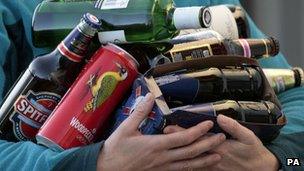Minimum pricing: Challenge to Scottish alcohol legislation fails
- Published
The Scotch Whisky Association loses its legal challenge against government plans for minimum pricing for alcohol
A legal challenge to the Scottish government's plans to introduce minimum pricing per unit of alcohol has failed.
The Scotch Whisky Association (SWA) took action against the proposal, which it said would breach European law, after it was passed by MSPs.
A Court of Session , externalruling dismissed the action and said plans to introduce 50p per unit minimum pricing were legal.
The SWA said it was surprised and disappointed by the ruling and would appeal the decision.
Lord Doherty said the minimum alcohol pricing policy was within the powers of Scottish ministers and not incompatible with EU law.
A summary of his decision said: "The court ruled that the Acts of Union were not an impediment to the minimum pricing measures.
"The court also decided that the measures were not incompatible with EU law."
Under the Scottish government's plans, the cheapest bottle of wine would be £4.69 and a four-pack of lager would cost at least £3.52.
The SWA had warned the measure would set a precedent where health concerns were allowed to interfere with the free trade of goods and services.
In his ruling, Lord Docherty also said there was no need to refer any issues around alcohol pricing and EU law to another court.
He said: "The court was satisfied that it was unnecessary and inappropriate to refer any question of EU law to the Court of Justice for a preliminary ruling."
Scottish Health Secretary Alex Neil said: "We welcome today's favourable opinion from the Court of Session on minimum unit pricing of alcohol.
"We have always believed minimum unit pricing is the right thing to do to tackle Scotland's problematic relationship with alcohol."
'Public interest'
Gavin Hewitt of the Scotch Whisky Association said: "Clearly it is in our interest to have this appealed.
"We don't believe that the issues have been totally addressed and we are very anxious that the court re-examines and reviews where it stands."
Trade body Spirits Europe, which was part of the petition against minimum pricing along with the SWA, has also said it will appeal the judgement.
Director Paul Skehan added: "We are confident that, on appeal, the measure will be proven to be illegal and counter to the rules underpinning the single European market.
"We are surprised that the court decided it was unnecessary to refer any question of EU law to the Court of Justice for a preliminary ruling, considering the existing legal background."
'Disproportionate response'
Scottish brewer, Tennents, which supports the Scottish government's minimum pricing policy, said the ruling was "an important step towards helping tackle Scotland's alcohol misuse issues".

The Scottish government wants to introduce a minimum price of 50p per unit
Managing director, John Gilligan, said: "We believe that responsible adults have the right to enjoy drinking sensibly and that minimum pricing may contribute to an improvement in society."
Alcohol Focus Scotland called on the Scottish Whisky Association not to pursue any further legal action.
Chief executive Dr Evelyn Gillan said: "The alcohol industry has consistently opposed minimum unit pricing as they oppose any measures that are likely to be effective.
"Thankfully, today the public interest has prevailed over the profits of the big alcohol corporations."
BMA Scotland also welcomed the ruling.
Chairman Dr Brian Keighley said: "Any credible alcohol strategy must have at its heart measures to tackle price and availability. Scotland is awash with cheap alcohol and Scots are paying the price with their health."
A spokesman for the UK government's top Scottish law officer, Lord Wallace, said: "The Advocate General made submissions in this case on behalf of the UK government supporting the compatibility of minimum unit pricing with EU law.
"He therefore welcomes the court's decision to refuse the Scotch Whisky Association's challenge, but recognises that this decision may be subject to an appeal."
The UK government said it was still considering whether to introduce minimum alcohol pricing in England and Wales.
The Home Office is evaluating a large number of responses to a consultation exercise about the policy before announcing how it will proceed.
MSPs at the Scottish Parliament passed The Alcohol (Minimum Pricing) (Scotland) Act 2012, external in May 2012, setting the 50p minimum unit price as part of an effort to tackle alcohol misuse.
The European Commission has previously voiced opposition to Scotland's plans for minimum pricing, describing them as a disproportionate response to the country's drink problems.
The commission said it believed the measures could restrict imports of foreign alcohol.
- Published24 April 2013
- Published7 February 2013
- Published15 January 2013
- Published6 December 2012
- Published28 November 2012